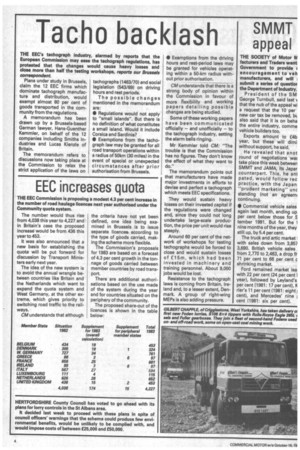Tacho backlash
Page 4

If you've noticed an error in this article please click here to report it so we can fix it.
THE EEC's tachograph industry, alarmed by reports that the European Commission may ease the tachograph regulations, has protested that the changes would cause heavy losses and close more than half the testing workshops, reports our Brussels correspondent.
Plans under study in Brussels, claim the 12 EEC firms which dominate tachograph manufacture and distribution, would exempt almost 80 per cent of goods transported in the community from the regulations.
A memorandum has been drawn up by a Brussels-based German lawyer, Hans-Guenther Kemmler, on behalf of the 12 companies including Smiths Industries and Lucas Kienzle of Britain.
The memorandum refers to discussions now taking place at the Commission to relax the strict application of the laws on tachographs (1463/70) and social legislation (543/69) on driving hours and rest periods.
The possible changes mentioned in the memorandum are: • Regulations would not apply to "small islands". But there is no definition of what constitutes a small island. Would it include Corsica and Sardinia?
I Exemptions from the tachograph law may be granted for all road transport operations within a radius of 50km (30 miles) in the event of special or unexpected circumstances after prior authorisation from Brussels. • Exemptions from the driving hours and rest-period laws may be granted for vehicles operating within a 50-km radius without prior authorisation.
CM understands that there is a strong body of opinion within the Commission in favour of more flexibility and working papers detailing possible changes are being studied.
Some of these working papers have been communicated officially — and unofficially — to the tachograph industry, setting the alarm bells ringing.
Mr Kemmler told CM: "The trouble is that the Commission has no figures. They don't know the effect of what they want to do."
The memorandum points out that manufacturers have made major investments in efforts to devise and perfect a tachograph which meets EEC specifications.
They would sustain heavy losses on their invested capital if the regulations were changed and, since they could not long undertake large-scale production, the price per unit would rise steeply.
Around 60 per cent of the network of workshops for testing tachographs would be forced to close and would sustain losses of £15m, which had been invested in machinery and training personnel. About 9,000 jobs would be lost.
Resistance to the tachograph laws is coming from Britain, Ireland and, to a lesser extent, Denmark. A group of right-wing MEPs is also adding pressure.




















































































